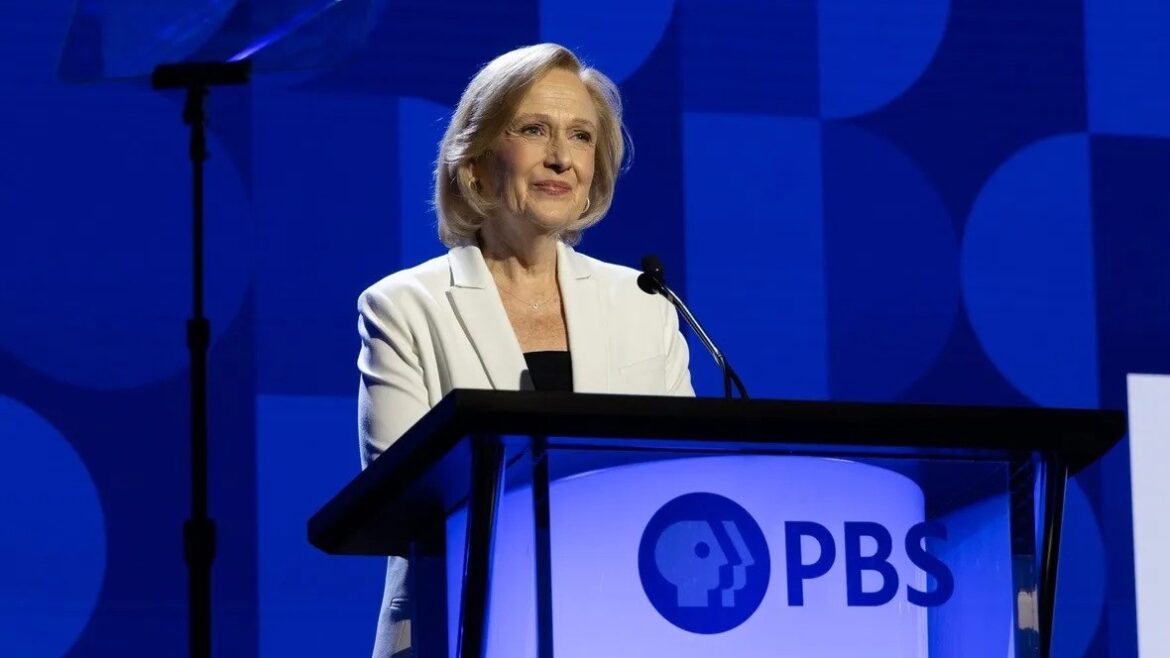PBS floats 2026 dues proposal as CEO prepares case for House DOGE hearing

Courtesy of PBS
PBS President Paula Kerger at the 2024 PBS Annual Meeting in Las Vegas.
A draft budget presented to the PBS board Friday proposes keeping station dues level in fiscal year 2026.
The preliminary budget, presented during a PBS finance committee meeting Thursday, would generate a total of $227 million in station assessments, the same amount as FY25.
With approval from the full PBS board Friday, the proposal goes to member stations for review while PBS President Paula Kerger and NPR CEO Katherine Maher prepare to testify before the House Committee on Oversight and Government Reform’s subcommittee on Delivering on Government Efficiency.
In her report to the board Friday, Kerger confirmed that the hearing, which will be chaired by Republican Rep. Marjorie Taylor Greene of Georgia, is set for this month. Kerger did not specify the date. PBS declined to confirm the date for Current and NPR has not replied to Current’s inquiry about the timing.
As Congress faces a deadline to approve a continuing resolution to fund the government this fiscal year, CPB’s forward-funded appropriation for fiscal 2027 hangs in the balance. Eliminating CPB’s funding is a recurring talking point for Republican critics in Congress, the Trump Administration and Elon Musk in his role overseeing the Department of Government Efficiency.
Kerger described the hearing as “an opportunity … for us to at least try to make our case directly to Congress and highlight the important work that we’re doing across the country,” Kerger said. She also noted that FCC Chair Brendan Carr’s examination of public media’s underwriting practices poses another challenge.
“I think there’s a great misunderstanding about where the federal dollars actually flow,” Kerger said. “ … I’ve always mused that Washington is probably not the best place for PBS to be housed because I think there’s a perception that we somehow are a federal agency, or that we’re fully funded by the government, and in fact, as you know, the lion share of the federal appropriation goes directly to stations.”
“With so many uncertainties facing so many stations at this moment, this feels like the right decision,” she said of PBS’ FY26 budget proposal.
The request to maintain dues at current levels marks a shift from PBS’ last budgeting cycle. For FY25, PBS proposed and secured approval for an $8.7 million increase in station assessments over FY24 levels. PBS’ draft FY26 budget projects that the organization will break even at $370.1 million, according to Catherine Robb, chair of the board’s finance committee. That’s a $3.3 million decrease from the FY25 total budget, which was $373.4 million.
At the Thursday committee meeting, PBS CFO Tom Tardivo presented the financial results of the first half of FY25, through Dec. 31, which showed net income of $4.4 million, or $4.1 million above the current year’s budget, for PBS and subsidiaries.
The full PBS board voted Friday to distribute the proposal to stations for feedback. A vote on the final budget will be taken at its June meeting.
PBS continues to use its funding to invest in a variety of programs and improve PBS Passport, the member supported streaming service, Robb said at the full board meeting.
On Friday, PBS showcased a trailer for Weathered: Inside the LA Firestorm, a special that premieres on public television stations March 19. The program, hosted by Maiya May, released its debut six episodes last year.
PBS also noted the success of new PBS Kids programs like Carl the Collector, which features characters who have autism.
The presentation to board members also highlighted PBS’ support for public affairs programs like Firing Line, hosted by Margaret Hoover, which features Republican and conservative guests like New York Times columnist Ross Douthat and former House Speaker Newt Gingrich, who sought to zero out public broadcasting’s federal appropriation in 1995 when he led the Republican majority.
In her remarks, Kerger said the public media system is a “public-private partnership” that works to ensure everyone in the country receives access to a local public media service, and that it is especially important in places where commercial media has left those areas.





